| 4 March |
• yesterday • tomorrow |
| Optional Memorial of Saint Casimir |
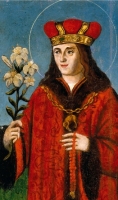
• Casimir of Cracow
• Kazimieras, Kazimierz, Kazimir
Fifteenth century Polish prince, the younger son of King Casimir IV of Poland and Elizabeth of Austria. Grand Duke of Lithuania in 1471; third in line for the throne. Lived a highly disciplined, even severe life, sleeping on the ground, spending a great part of the night in prayer, dedicating himself to lifelong celibacy. He had a great devotion to Mary, supported the poor, and lived a virtuous life amid the dissolute court.
Hungarian nobles prevailed upon Casimir's father to send his 15-year-old son to be their king; Casimir obeyed, taking the crown, but refusing to exercise power. His army was outnumbered, his troops deserting because they were not paid. Casimir returned home, and was a conscientious objector from that time on.
He returned to prayer and study, maintained his decision to remain celibate even under pressure to marry the emperor's daughter. Reigned briefly as king during his father's absence.
3 October 1458 in Wawel, Kraków, Poland
• 4 March 1484 at Grondo, Grand Duchy of Lithuania (in modern Belarus) of tuberculosis
• buried in the Chapel of Saint Casimir, cathedral of Vilnius, Lithuania
• 1522 by Pope Adrian VI
• 1602 by Pope Clement VIII
• against plague
• bachelors
• kings
• princes
• single laymen
• Lithuania (proclaimed by Pope Urban VIII in 1636
• Poland
• Grodno, Belarus, diocese of
• crown
• lily
By the power of the Holy Spirit, Casimir burned with a sincere and unpretentious love for almighty God. So rich was his love and so abundantly did it fill his heart, that it flowed out from his inner spirit toward his fellow men. As a result, nothing was more pleasant, nothing more desirable for him, than to share his belongings, and even to dedicate and give his entire self to Christ's poor, to strangers, to the sick, to those in captivity, and to all who suffer. To widows, orphans, and the afflicted, he was not only a guardian and patron but a father, son, and brother.
He actively took up the cause of the needy and unfortunate and embraced it as his own; for this reason the people called him the patron of the poor. Though the son of a king and descendant of a noble line, he was never haughty in his conversation or dealings with anyone, no matter how humble or obscure.
He always preferred to be counted among the meek and poor of spirit, among those who are promised the kingdom of heaven, rather than among the famous and powerful men of this world. - from a biography of Saint Casimir written by a contemporary
https://catholicsaints.info/saint-casimir-of-poland/
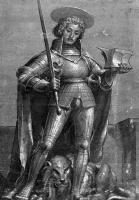
Hadrian
• 8 September (translation of relics)
• 26 August (Greek calendar)
Pagan officer and body guard at the imperial court of Nicomedia. Adrian was so impressed by the strength and faith shown by persecuted Christians that he declared himself a Christian, though he had not even been baptized. He was immediately arrested and tortured. He and fellow prisoners were tended by his wife, Saint Natalia until they were executed.
• thrown to a lion, which refused to touch him
• legs broken with an anvil, and then hacked to pieces with a sword on 4 March 304
• body burned, but when a storm extinguished the fire his wife salvaged his dismembered hand as a relic, and took it to Argyropolis near Constantinople
• other relics at Grammont (Geertsbergen), Belgium
• against epilepsy
• against plague
• epileptics
• arms dealers
• arms manufacturers
• butchers
• Flemish brewers
• prison guards
• soldiers
• Germany
• Flanders, Belgium
• Metalica, Italy
• axe
• an anvil upon which rests his chopped off hands and feet
• man being brought to land by dolphins
• man in armour
• man in armour, with hammer, anvil, and sword
• man laying his hand on an anvil to be chopped off
• man thrown off a cliff into the sea
• man trampling on a lion
• man with a hammer and anvil in one hand, a sword in the other
• man with a hammer in his left hand, a sword in right
• man with a raven descending toward him
• man with an anvil in his hand, at his feet or nearby
• man with an anvil in his left hand, a sword in right
• man with his arms and legs chopped off
• with Saint Natalia
https://catholicsaints.info/saint-adrian-of-nicomedia/
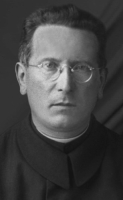
Gjon Fausti
Eldest of twelve brothers in his family. Studied at the Inter-Brescia seminary where he became friends with the future Pope Paul VI. Graduated from the Pontifical Gregorian University in Rome, Italy in 1922, and was ordained as a priest on 9 July 1922. Taught philosophy at the Inter-Brescia seminary in 1923. Joined the Jesuits in Gorizia, Italy in 1924. Chair of the philosophy department in Scutari, Albania from 1929 to 1932. Chair of the department of philosophy in Mantua, Italy and leader of the Jesuits there in 1932. Father Gjon suffered from lengthy health problems which required regular treatment and reduction in his work schedule from 1932 to 1936, but on 2 February 1936 he made his solemn profession in the Jesuits and returned to full-time adminstration, teaching and ministry. Rector of the Pontifical Seminary of Scutari and its adjoining Xaverian college in July 1942. Worked to start a Christian-Muslim dialogue in Albania. Transferred to Tirana, Albania in 1943 where he worked to help and protect all Albanians in the privations and persecutions of World War II. Vice-provincial of the Jesuits in Albania in 1945. Arrested by the Communist regime on 31 December 1945, and in a show trial, was sentenced to death for being a spy for the Vatican and a traitor to Albania. Martyr.
19 October 1899 in Brozzo, Marcheno, Val Trompia, Brescia, Italy
• shot by a machine-gun squad at 6am on 4 March 1946 at the cemetery in Shkodrë, Albania
• the body was left laying outside for a day to show the locals what would happen to those who opposed the Communists
• buried with other martyrs in a mass grave near the nearby river bed on the night of 5 March; rubbish bins were stacked on the grave to conceal it
• 5 November 2016 by Pope Francis
• beatification celebrated at the Square of the Cathedral of Shén Shtjefnit, Shkodér, Albania, presided by Cardinal Angelo Amato
https://catholicsaints.info/blessed-giovanni-fausti/
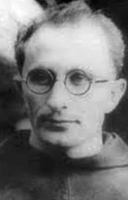
Brother Gjon
Son of Loros and Maré Ashtés. Studied at Franciscan schools, and became a Franciscan Friar Minor novice on 4 October 1922, making his perpetual vows on 13 September 1928 and taking the name Gjon. Studied theology in the Netherlands. Ordained a priest on 15 March 1931. Studied science, history and philosophy in Louvain, Belgium. Received a doctorate in philosophy from the Sorbonne University in Paris, France in 1937. Back in Albania he taught philosophy and French at a number of levels, and served as a spiritual director to many of his students. An open anti-Fascist, he was forced to flee to Yugoslavia when the Italians invaded Albania. Returning home, he ministered to those suffering in the privations of World War II, and continued to speak against Fascism and Communism. Helped found the Christian Democrats in Albania which led to his arrest by the Communist regime that took power after World War II; he was arrested in a class room in the middle of a lecture. He spent several months being tortured in prison, was finally given a show trial, found guilty of treason against the Communist government, and on 22 February 1946 he was sentenced to death. Martyr.
27 July 1907 in Shkodré, Albania
• shot by a machine-gun squad at 6am on 4 March 1946 at the cemetery in Shkodrë, Albania
• the body was left laying outside for a day to show the locals what would happen to those who opposed the Communists
• buried with other martyrs in a mass grave near the nearby river bed on the night of 5 March; rubbish bins were stacked on the grave to conceal it
• 5 November 2016 by Pope Francis
• beatification celebrated at the Square of the Cathedral of Shén Shtjefnit, Shkodér, Albania, presided by Cardinal Angelo Amato
https://catholicsaints.info/blessed-kole-shllaku/
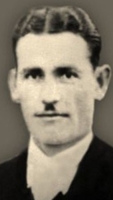
Qerim served in the Albanian gendarmerie in the reign of Zog I, rising to the rank of lieutenant. During World War II, he ran a shop and avoided politics. He married Marije Vata in September 1944. After the war, when the Communists took over Albania, Querim was known to be anti–Communist, pro-Albanian nationalist, and a very pious Catholic, spending much time in prayer and none in violence. He was arrested on 3 December 1945 for opposing the mandatory, one-party-only vote, and for being a member of the Albanian Union, which the Communists considered violent fascists. After a show trial, Qerim was sentenced to death. Martyr. His only child was born six months after his death.
18 February 1919 in Vudanje, Yugoslavia (modern Vuthaj, Shkodrë, Albania)
• shot by a machine-gun squad at 6am on 4 March 1946 at the Varrezat e Rrmajit cemetery on the Rruga Hile Mosi in Shkodrë, Albania
• the body was left laying outside for a day to show the locals what would happen to those who opposed the Communists
• buried with other martyrs in a mass grave near the nearby river bed on the night of 5 March; rubbish bins were stacked on the grave to conceal it
• 5 November 2016 by Pope Francis
• beatification celebrated at the Square of the Cathedral of Shën Shtjefnit, Shkodër, Albania, presided by Cardinal Angelo Amato
I forgive those who may have hurt me. I forgive those who have sentenced me, as well as my executioners. Long live Christ our King. Long live Albania! – Blessed Qerim’s last words
https://catholicsaints.info/blessed-qerim-sadiku/
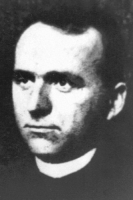
Feeling an early call to the priesthood, Daniel entered the Pontifical Seminary in Scutari, Albania at age 12. He joined the Jesuits in Gorizia, Albania on 8 July 1926, and made his final profession on 2 February 1942. He studied philosophy in Chieri, Italy from 1931 to 1933, and then returned to Albania in 1935 to teach Latin in the seminary. Ordained a priest on 15 July 1938. In 1940 he resumed teaching at the Scutari seminary, worked parish missions and conducted religious education in mountain parishes. Rector of Saverjane College and the Pontifical Seminary in 1944. Arrested by Communist authorities on 31 December 1945, accused of being part of the leadership of the anti–Communist Albanian Union. Father Daniel had nothing to do with the group, but following a show trial, he was executed. Martyr.
2 December 1906 in Blinisht, Zadrima, Lezhë, Albania
• shot by a machine-gun squad at 6am on 4 March 1946 at the cemetery in Shkodrë, Albania
• the body was left laying outside for a day to show the locals what would happen to those who opposed the Communists
• buried with other martyrs in a mass grave near the nearby river bed on the night of 5 March; rubbish bins were stacked on the grave to conceal it
• 5 November 2016 by Pope Francis
• beatification celebrated at the Square of the Cathedral of Shën Shtjefnit, Shkodër, Albania, presided by Cardinal Angelo Amato
https://catholicsaints.info/blessed-daniel-dajani/
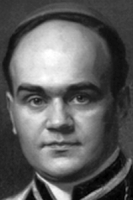
Second of five children in a devoutly Catholic family; his father was a school teacher and principal. Graduated from a Benedictine high school in Esztergom, Hungary in 1909. With the support of Cardinal Kolos Vaszary, Zoltán then a studied in Rome, Italy at the Collegium Germanico-Hungaricum and Pontifical Gregorian University where he earned a doctorates in philosophy in 1912, theology in 1913 and a degree in canon law. Forced to leave Italy at the start of World War II, he finished his studies in Innsbruck, Austria, and was ordained there on on 28 October 1915.
Chaplain of Komárom, Hungary. Assigned several administrative tasks and positions at the archdiocese office Esztergom from 1917 to 1937. Auxiliary Bishop of Esztergom, Hungary and Titular Bishop of Sinope on 22 September 1937. Worked to keep the see functioning as the archbishop and other officers were imprisoned in the anti–Christian persecutions of the Hungaian Communists. On 29 June 1950 it was Zoltán’s turn; he was imprisoned, isolated, tortured, starved, abused, and set to forced labour until his health was finally destroyed. Martyr.
2 January 1892 in Hatvan, Heves, Hungary
4 March 1951 in Kistarcsa, Gödölloi, Hungary
• 1 November 2009 by Pope Benedict XVI
• recognition Mass celebrated in the cathedral of Esztergom, Hungary
https://catholicsaints.info/blessed-zoltan-lajos-meszlenyi/
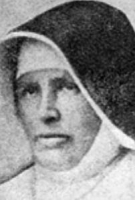
• Eulalie Victoire Jacqueline Viel
• Eulalie-Victoire Viel
• Placida Viel
One of eight children of a farm family. Niece of Saint Marie Madeleine Postel. Joined the Sisters of the Christian Schools at age 18, taking the name Placide. She had little education, and studied for a while at Argentan, France. Worked in school administration, founded new convents, and served as novice mistress. Assistant-general of the Sisters at 26, an appointment that caused great resentment among her sisters. Mother-general of the order at age 31 on the death of her aunt. Directed the institute, orphanages, nursery and elementary schools for the next 30 years, opening 36 schools for the poor in Normandy. Obtained papal authority for the order in 1859 from Pope Pius IX. Worked herself to death organizing relief during the Franco-Prussian War in 1877.
26 September 1815 at Quettehou, Normandy, France as Eulalie Victoire Jacqueline Viel
4 March 1877 at Saint-Sauveur-le-Vicomte, France of natural causes
6 May 1951 by Pope Pius XII
https://catholicsaints.info/blessed-placide-viel/
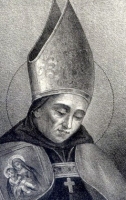
• Peter of Cava
• Peter of La Cava
• Peter I of Cava
Born to the Salerno nobility; relative of Saint Alferius of La Cava. Benedictine monk at Cava, Italy while still a young man; his abbot was Saint Leo of La Cava. Lived for a while as a hermit, and then was assigned to Cluny Abbey from 1062 to 1068. Bishop of Policastro, Italy in 1079; after two years of service, he resigned the see and returned to Cava where he served as co-adjutor abbot with Saint Leo. He was chosen abbot and tried to introduce the Cluniac reform, but was so strict that he caused strife in the house. He withdrew from office for a while, and even formed a house in the Cilento region of Italy. However, he was later recalled to La Cava and served decades as abbot with a much more fatherly attitude. During his time he brought in over 3,000 monks who then went out to found other houses and spread the Faith.
in Salerno, Italy
1123 of natural causes
1893 by Pope Leo XIII (cultus confirmed)
Policastro, Italy
https://catholicsaints.info/saint-peter-of-pappacarbone/
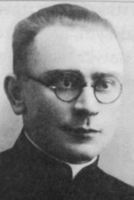
Ladislao Mackowiak
12 June as one of the 108 Martyrs of World War II
Priest in the diocese of Vilnius, Lithuania, serving as a parish priest in Ikazni, working with Blessed Stanislaw Pyrtek. For his faith and zealous preaching of the faith during the Nazi occupation of World War II, he was sentenced to death by the Gestapo. Warned of the danger, Father Wladyslaw insisted in staying to serve his parishioners. Martyr.
14 November 1910 in Sytki, Podlaskie, Poland
shot on 4 March 1942 in Berezovichi (Berezwecz), Hrodzyenskaya voblasts', Belarus
13 June 1999 by Pope John Paul II
I am going to make the last sacrifice of my life. In three hours I will stand before the Lord. My last thoughts, therefore, are directed to You, Most Worthy Archpaster, and for the last time I pay tribute to my filial respect and affection. I am glad that God has chosen me and, above all, that He gives me grace and strength. – from a note in Blessed Waldyslaw wrote in his breviary, addressed to his bishop, while waiting his execution
https://catholicsaints.info/blessed-wladyslaw-mackowiak/
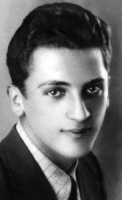
A lifelong layman in the archdiocese of Shkodrë-Pult, Albania, Gjelosh was educated by Franciscans, and studied at the Shkodër Seminary. He was a soldier, worked as a secretary, and was a member of the anti–Communist group, Albanian Union. Gjelosh was arrested on 3 December 1945 accused of treason for not supporting Communism, and of being a Vatican spy for remaining a devout Catholic. He was given a show trial on 22 February 1946, convicted, and sentenced to death. Martyr.
2 September 1925 in Shosh, Shkodré, Albania
• shot by a machine-gun squad at 6am on 4 March 1946 at the cemetery in Shkodrë, Albania
• the body was left laying outside for a day to show the locals what would happen to those who opposed the Communists
• buried with other martyrs in a mass grave near the nearby river bed on the night of 5 March; rubbish bins were stacked on the grave to conceal it
• 5 November 2016 by Pope Francis
• beatification celebrated at the Square of the Cathedral of Shén Shtjefnit, Shkodér, Albania, presided by Cardinal Angelo Amato
https://catholicsaints.info/blessed-gjelosh-lulashi/
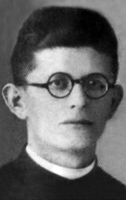
Mark was a 3rd year seminarian at the Albanian Pontifical Seminary in the archdiocese of Shkodër-Pult, Albania. For his adherence to his faith, he was arrested by Communist authorities on 7 December 1945, imprisoned in Shkodër for several months, sentenced to death on 22 February 1946, and then executed. Martyr.
30 September 1919 in Ranza Bushat, Shkodër, Albania
• shot by a machine-gun squad at 6am on 4 March 1946 at the Varrezat e Rrmajit cemetery on the Rruga Hile Mosi in Shkodrë, Albania
• the body was left laying outside for a day to show the locals what would happen to those who opposed the Communists
• buried with other martyrs in a mass grave near the nearby river bed on the night of 5 March; rubbish bins were stacked on the grave to conceal it
• 5 November 2016 by Pope Francis
• beatification celebrated at the Square of the Cathedral of Shën Shtjefnit, Shkodër, Albania, presided by Cardinal Angelo Amato
https://catholicsaints.info/blessed-mark-cuni/
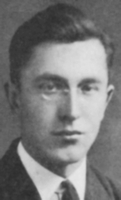
Stanislao Pyrtek
12 June as one of the 108 Martyrs of War War II
Priest in the diocese of Vilnius, Lithuania, ordained in 1940. He served in the Ikazni parish, working with Blessed Wladyslaw Mackowiak. Imprisoned and executed by the Gestapo in the Nazi occupation for the offense of being a priest.
21 March 1913 in Bystra Podhalanska, Malopolskie, Poland
shot on 4 March 1942 in the forest near Berezovichi (Berezwecz), Hrodzyenskaya voblasts', Belarus
13 June 1999 by Pope John Paul II
A few hours separate me from an undeserved death. It is the priest's duty to offer this sacrifice for Christ. I die for teaching religion. Don’t cry or be sad for me. I am sending you a priestly blessing. After three months in prison, I am glad that I am worthy to suffer and die. - Blessed Stanislaw writing to his family as he awaited execution
Long live Christ the King! – Blessed Stanislaw's dying words
https://catholicsaints.info/blessed-stanislaw-pyrtek/
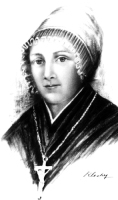
• Mère Saint-Louis
• Mother Saint Louis
Married to Chrétien François de Lamoignon de Basville, a politician who was murdered in the French Revolution; they had five children, two of whom made to adulthood, one of whom became Prime Minister of France in the 1830's.
On 25 May 1803 she founded the Sisters of Charity of Saint Louis in Vannes, France for the education of poor and abandoned girls.
3 October 1763 in Paris, France
• 4 March 1825 in Vannes, Morbihan, France of natural causes
• interred in the cathedral of Saint Peter the Apostle in Vannes
27 November 2011 by Pope Benedict XVI
Sisters of Charity of Saint Louis
https://catholicsaints.info/blessed-marie-louise-elisabeth-de-lamoignon-de-dole-de-champlatreux/
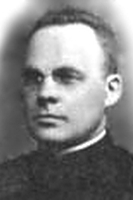
Miecislao Bohatkiewicz
12 June as one of the 108 Martyrs of World War II
Priest in the diocese of Pinsk, Belarus known as an inspiring preacher with a ministry to the poor. Murdered in the Nazi persecution of Christians. Martyr.
1 January 1904 in Kriukai (Krykaly), Marijampole rajonas, Lithuania
• shot on 4 March 1942 in the forest outside Berezovichi (Berezwecz), Hrodzyenskaya voblasts', Belarus
• his body was dumped in a communal grave near the place of execution
13 June 1999 by Pope John Paul II
Do not cry for me, and be glad that your offspring and brother have passed the exam. I only ask for your prayers. I forgive all my enemies with all my heart, I would like to serve heaven to all of them. – from a letter by Blessed Mieczyslaw to his family not long before his execution
https://catholicsaints.info/blessed-mieczyslaw-bohatkiewicz/
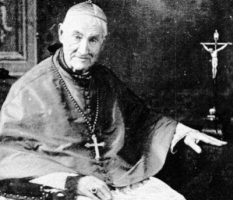
Johannes Antonius Farina
Son of Pedro and Francisca Bellame. Studied at the seminary in Vicenza, Italy, and taught there while still a student. Ordained on 15 January 1827. Founder of the Institute of the Sisters Teachers of Saint Dorothy, Daughters of the Sacred Heart in 1836; they are dedicated to teaching the poor. Bishop of Treviso, Italy on 20 September 1850. Ordained the future Pope Saint Pius X on 18 September 1858. Bishop of Vicenza on 28 September 1860, a seat he held until his death.
11 January 1803 in Gambellara, Vincenza province, Italy
4 March 1888 from a stroke at Vicenza, Italy
23 November 2014 by Pope Francis
https://catholicsaints.info/saint-giovanni-antonio-farina/
22 November as one of the Martyrs of England, Scotland, and Wales
Lifelong layman; tailor by trade. An informal but enthusiastic evangelist for Catholicism. While in London, England seeking treatment for a leg wound, he was imprisoned in Newgate for the crime of harbouring priests; the chains and lack of medical care led to amputation of the injured leg. His friends petitioned for his release, which was granted, and Nicholas resumed work as a tailor at Smithfield, London. Arrested again for harbouring priests, he was thrown into Bridewell prison, tried for the crime of making clothes for a priest, and sentenced to death. Martyr.
Grantley, Yorkshire, England
hanged, drawn and quartered on 4 March 1590 in front of his home on Fetter Lane, Smithfield, London, England
15 December 1929 by Pope Pius XI
https://catholicsaints.info/blessed-nicholas-horner/
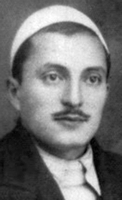
A lifelong layman of the diocese of Sapës, Albania, Fran married Prenda Alija Kamerin in October 1934. He was a farmer, salesman and livestock merchant. Arrested by Communist authorities in Iballë, he was imprisoned in Shkodër on 24 December 1945. On 22 February 1946, after a show trial, he was sentenced to death for adhering to his faith. Martyr.
13 August 1916 in Kodër Qurk in Iballë of Pukës, Shkodër, Albania
shot at 5am on 4 March 1946 in Tiranë, Albania
• 5 November 2016 by Pope Francis
• beatification celebrated at the Square of the Cathedral of Shën Shtjefnit, Shkodër, Albania, presided by Cardinal Angelo Amato
https://catholicsaints.info/blessed-fran-mirakaj/
Enrico
25 February (Lucca, Italy)
Carmelite brother. Pilgrim to the Holy Land and to Rome, Italy. He travelled and is associated with Blessed Avertano of Lucca. There are some records that list Blessed Enrico as Avertano’s companion, Enrico and Romeo are apparently the same person.
early 14th century
• 4 March 1380 in Lucca, Italy of natural causes
• interred in the church of Saint Peter outside the walls of Lucca
• re-interred at the cathedral in 1513
• re-interred in the re-built church of San Pietro in 1646
• re-interred in 1807
• re-interred in the church of Santi Paolino e Donato in Lucca in 1826
1842 by Pope Gregory XVI (cultus confirmation)
https://catholicsaints.info/blessed-romeo-of-lucca/
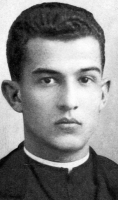
Drawn to religious life in his early teens. Had a great love of literature, especially Catalan, and wrote poetry. Professed cleric in the Sons of the Holy Family. Entered the seminary in Barcelona, Spain, but it was closed at the outbreak of the Spanish Civil War. Captured, tortured and executed for trying to protect a church's icons. Martyr.
7 October 1916 in Mura, Barcelona, Spain
• shot on 4 March 1937 in Montcada, Barcelona, Spain
• body dumped into a mass grave and remains never identified
13 October 2013 by Pope Francis
https://catholicsaints.info/blessed-pere-roca-toscas/
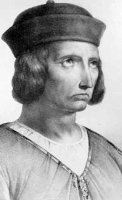
Son of Count Amadeus III of Savoy and Matilda of Vienna. Educated by Blessed Amadeus of Lausanne. Count of Savoy from age 13 when his father died. Married several times; widower several times. Joined the Carthusian monastery at Haute-Combe, but was obliged to resume political charge of the Savoy. Eventually assumed a Cistercian habit.
1136 at Avigliana, Italy
1189 at Chambéry, France
1838 by Pope Gregory XVI (cultus confirmed)
https://catholicsaints.info/blessed-humbert-iii-of-savoy/
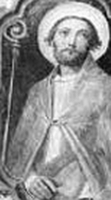
Paul, Paolino
3 March (translation of relics)
Brother of Saint Gaudenzio of Brescia. Priest. Tenth bishop of the diocese of Brescia, Italy, serving in the early 5th century.
• 5th century of natural causes
• relics re-interred in the basilica of Sant'Eusebio al Goletto
• relics re-interred in the church of San Pietro in Oliveto, Italy on 3 March 1498
• relics re-interred in the church of Sant'Agata in 1798
https://catholicsaints.info/saint-paolo-of-brescia/
Apianus, Appiano, Appianus
Benedictine monk at the abbey of Saint Peter of Ciel d'Oro, Pavia, Italy. Steward of his house's goods. Hermit at Comacchio, Italy where he evangelized the area.
8th century in Liguria, Italy
• c.800 at Comacchio, Italy of natural causes
• following miracles at his grave, his relics were translated to the church of San Appian in Comacchio
• during an attempted theft of the relics, their transport would not go past the church of San Maurus, so the relics were re-enshrined there
https://catholicsaints.info/saint-appian-of-comacchio/
• Christopher Bayles
• Christopher Evers
29 October as one of the Martyrs of Douai
Educated at Rome, Italy and Rheims, France. Ordained at Douai, France in 1587. Returned to England in 1588 to minister to covert Catholics, using the name Christopher Evers. Arrested and martyred for the crime of priesthood.
Coniscliffe, Durham, England
hanged, drawn and quartered on 4 March 1590 in Fleet Street, London, England
15 December 1929 by Pope Pius XI
https://catholicsaints.info/blessed-christopher-bales/
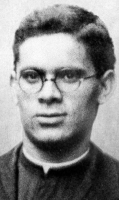
Professed cleric in the Sons of the Holy Family. Seminarian. When the persecutions of the Spanish Civil War began, he tried to flee to Rome, Italy to continue his studies. However, he was imprisoned and executed for his faith. Martyr.
14 January 1912 in Vilviestre de Muñó, Burgos, Spain
• 4 March 1937 in Montcada, Barcelona, Spain
• body has not been located
13 October 2013 by Pope Francis
https://catholicsaints.info/blessed-pedro-ruiz-ortega/
Felice
Born to a wealthy family, Felix withdrew from the world to live as a hermit on Ouessant Island, France. Benedictine monk at Saint Benoit sur Loire monastery, Fleury-sur-Loire, France after fleeing there to escape Norman invaders. In 1008 he was assigned to restore the great Rhuys abbey which had been founded by Saint Gildas the Wise and later destroyed by the Normans; he served as abbot to the new brothers.
c.970 near Quimper, Brittany (part of modern France)
4 March 1038 of natural causes
https://catholicsaints.info/saint-felix-of-rhuys/
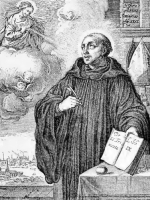
Benedictine monk. Abbot of the run down abbey of Ottobeuren. Under his leadership, the house had a resurgence, and both the place and Rupert became known for their piety.
latter 12th century
• 13th century of natural causes
• relics enshrined a chapel devoted to him at the Ottobeuren monastery
https://catholicsaints.info/blessed-rupert-of-ottobeuren/

Efrem
7 March (Greek calendar)
Bishop who was sent as an missionary by the Patriarch of Jerusalem to convert people in the Chersonese region of Greece. The local pagans who would not convert were so vehemently against the Christians that the emperor Constantine had them expelled from the region. Martyr.
6 March in the Chersonese region of Greece
https://catholicsaints.info/saint-ephrem-the-martyr/

Walburga, Waldburg
Nun. First abbess of the monastery in Neuenheerse, Germany in 868. The house was established by her brother, Bishop Luithard of Paderborn, to promote Christianity among the pagan Saxons, and the sisters were very active in the community, and not required to take vows.
1823 (elevation of her relics)
https://catholicsaints.info/blessed-valburga-of-neuenheerse/
A group of 20 Christians murdered together for their faith. The only details about them to survive are three of their names - Archelaus, Cyrillos and Photius.
Nicomedia, Bithynia (in modern Turkey)
https://catholicsaints.info/martyrs-of-nicomedia-4-march/
Odhren
May have been a member of the Hungarian royal family. Missionary bishop on the isle of May in the Firth of Forth off the western coast of Britain. Martyred with fellow missionaries by Danish invaders. May have evangelized in Ireland. May have been bishop of Saint Andrews; records are unclear. Leader of a group of martyrs killed by pagan Dane.
at Pannonia, Hungary
c.875
https://catholicsaints.info/saint-adrian-of-may/

Basilio, Basilius
7 March (Byzantine Church)
Missionary bishop who was sent by the Patriarch of Jerusalem to convert people in the Chersonese region of greater Greece (modern Crimea) in the late 3rd century. Martyr.
6 March 299 in the Chersonese region of Greece
https://catholicsaints.info/saint-basil-of-the-chersonese/

Capitone, Gapito
7 March (Greek calendar)
Bishop who was sent by emperor Constantine to work for the conversion of people in the Chersonese region of Greece.
22 December 300 in the Chersonese region of Greece of natural causes
https://catholicsaints.info/saint-gapito-the-martyr/
Leodevaldo, Léodowald, Leudeuald, Leodovaldus
Known initially for his powerful build, fiery temper, and bullying demeanor. In later life he reformed, took his religion seriously, spent 30 years as bishop of Avranches, France, and was proclaimed a saint by the parishioners in his see.
c.614 of natural causes
https://catholicsaints.info/saint-leonard-of-avranches/
Agatodoro
7 March (Greek calendar)
Bishop who worked for the conversion of people in the Chersonese region of Greece. Martyr.
6 March in the Chersonese region of Greece
https://catholicsaints.info/saint-agathodorus-the-martyr/

Elpidio
7 March (Byzantine Church)
Bishop who worked for the conversion of people in the Chersonese region of Greece. Martyr.
6 March 300 in the Chersonese region of Greece
https://catholicsaints.info/saint-elpidius-the-martyr-2/

Etereo, Ethereus, Etherius
7 March (Greek calendar)
Bishop who was sent by the Patriarch of Jerusalem to convert people in the Chersonese region of Greece in the early 4th century. Martyr.
https://catholicsaints.info/saint-aetherius-the-martyr/
Gistilian, Gistilianus, Gistlian, Giustilianus, Goeslan, Guistilianus, Gweslan
Son of Cynyr, chieftain of Menevia (western Wales) and Anna; brother of Saint Gwen and Saint Nonna; uncle of Saint David of Wales, Saint Cyby and Saint Cadfan. Monk. Teacher in the faith of Saint David. Sixth century bishop of Menevia, Wales.
https://catholicsaints.info/saint-gwestlan-of-menevia/

Eugenio
7 March (Greek calendar)
Bishop who worked for the conversion of people in the Chersonese region of Greece. Martyr.
6 March 300 in the Chersonese region of Greece
https://catholicsaints.info/saint-eugene-the-martyr/
4 May as one of the Martyrs of England, Scotland and Wales
Layman. Condemned for harboring priests. Martyr.
England
hanged, drawn and quartered on 4 March 1590 in Gray's Inn Lane, London, England
15 December 1929 by Pope Pius XI
https://catholicsaints.info/blessed-alexander-blake/
Basino, Basinos
Seventh-century Benedictine monk. Abbot of Saint Maximinus monastery in Trier, Germany. Bishop of Trier. Assisted English missionaries in the area, including Saint Willibrord of Echternach.
in Lorraine, France
c.705 of natural causes
https://catholicsaints.info/saint-basinus-of-trier/
• Philip of Clocharbainni
• Philip of Clogher
• Moggrudo, Moggrudonis, Mogrado, Mogrudo
Bishop of Cluain-Bainbh, Ireland.
https://catholicsaints.info/saint-philip-of-cluain-bainbh/
Caius
Officer in the Roman emperor's palace. Martyred with 27 companions.
drowned c.254 at Nicomedia (modern Izmit, Turkey)
https://catholicsaints.info/saint-gaius-of-nicomedia/
7 March (Greek calendar)
Fourth century missionary, possibly a bishop, who worked for the conversion of people on the island of Cyprus.
https://catholicsaints.info/saint-arcadius-of-cyprus/
Ouini, Owin
Steward in the household of Saint Etheldreda. Monk at Lastingham, England, and then near Lichfield, England. Spiritual student of Saint Chad.
c.680 of natural causes
https://catholicsaints.info/saint-owen/
Group of 900 martyrs buried in the catacombs of Saint Callistus on the Appian Way, Rome, Italy.
c.260
https://catholicsaints.info/martyrs-on-the-appian-way/
7 March (Greek calendar)
Fourth century missionary bishop who evangelized in Cyprus. Martyr.
https://catholicsaints.info/saint-nestor-the-martyr/
Martyr.
Ptolemais, Phoenicia
https://catholicsaints.info/saint-acacius-of-ptolemais/
CatholicSaints.Info Portable Edition